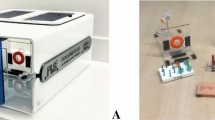Abstract
Aim
To develop and validate a scoring system for a training assessment tool using a box trainer which can objectively demonstrate progression in laparoscopic skills.
Method
170 assessments were performed over a 5-year period by doctors working in a busy paediatric surgical department. Each participant was scored based on experience and then undertook six laparoscopic tasks in a box trainer in a dry skills lab. The quicker and more accurate the performance, the lower the score. Validity and reliability tests were applied.
Results
Pearson correlation coefficient demonstrated that more experienced surgeons performed better than novices with an r of −0.63 (p < 0.001). The mean assessment scores improved (reduced) with increasing experience score [4140 (0–20), 2696 (21–40), 1969 (>40) p < 0.001]. Improvement in score was seen at all experience levels with greatest improvement seen in the less experienced (2315, 1820, 1571 p < 0.001). Cronbach’s alpha was 0.70 and the intraclass correlation coefficient for test–retest reliability was 0.81.
Conclusion
Construct validity with adequate reliability has been demonstrated for this simple training tool and scoring system. All experience levels demonstrated improvement in their laparoscopic skills by simulation training in a laparoscopic box trainer.









Similar content being viewed by others
References
Emken JL, Mcdougall EM, Clayman RV (2004) Training and assessment of laparoscopic skills. JSLS 8:195–199
van Empel PJ, van Rijssen LB, Commandeur JP et al (2013) Objective versus subjective assessment of laparoscopic skill. ISRN Minim Invasive Surg 2013:1–5. doi:10.1016/S0029-7844(99)00601-8
Derossis AM, Fried GM, Abrahamowicz M et al (1998) Development of a model for training and evaluation of laparoscopic skills. Am J Surg 175:482–487. doi:10.1016/S0002-9610(98)00080-4
Azzie G, Gerstle JT, Nasr A et al (2011) Development and validation of a pediatric laparoscopic surgery simulator. J Pediatr Surg 46:897–903. doi:10.1016/j.jpedsurg.2011.02.026
Vassiliou MC, Ghitulescu GA, Feldman LS et al (2006) The MISTELS program to measure technical skill in laparoscopic surgery. Surg Endosc 20:744–747. doi:10.1007/s00464-005-3008-y
Nataraja RM, Ade-Ajayi N, Curry JI (2006) Surgical skills training in the laparoscopic era: the use of a helping hand. Pediatr Surg Int 22:1015–1020. doi:10.1007/s00383-006-1746-0
Feldman LS, Sherman V, Fried GM (2004) Using simulators to assess laparoscopic competence: ready for widespread use? Surgery 135:28–42. doi:10.1016/S0039
Fried GM, Feldman LS, Vassiliou MC et al (2004) Proving the value of simulation in laparoscopic surgery. Ann Surg 240:518–528. doi:10.1097/01.sla.0000136941.46529.56
Vassiliou MC, Feldman LS, Andrew CG et al (2005) A global assessment tool for evaluation of intraoperative laparoscopic skills. Am J Surg 190:107–113. doi:10.1016/j.amjsurg.2005.04.004
Aggarwal R, Moorthy K, Darzi A (2004) Laparoscopic skills training and assessment. Br J Surg 91:1549–1558. doi:10.1002/bjs.4816
George D, Mallery M (2003) Using SPSS for windows step by step: a simple guide and reference. Boston
Parsons BA, Blencowe NS, Hollowood AD et al (2011) Surgical training: the impact of changes in curriculum and experience. J Surg Educ 68:44–51. doi:10.1016/j.jsurg.2010.08.004
Rosser JC, Rosser LE, Savalgi RS (1997) Skill acquisition and assessment for laparoscopic surgery. Arch Surg 132:200–204
Fried GM, Derossis AM, Bothwell J et al (1999) Comparison of laparoscopic performance in vivo with performance measured in a laparoscopic simulator. Surg Endosc 13:1077–1081 (discussion 1082)
Peters JH, Fried GM, Swanstrom LL et al (2004) Development and validation of a comprehensive program of education and assessment of the basic fundamentals of laparoscopic surgery. Surgery 135:21–27. doi:10.1016/S0039
Kramp KH, van Det MJ, Hoff C et al (2014) Validity and reliability of Global Operative Assessment of Laparoscopic Skills (GOALS) in novice trainees performing a laparoscopic cholecystectomy. J Surg Educ. doi:10.1016/j.jsurg.2014.08.006
Derossis AM, Bothwell J, Sigman HH et al (1998) The effect of practice on performance in a laparoscopic simulator. Surg Endosc 12:1117–1120
Chung JY, Sackier JM (1998) A method of objectively evaluating improvements in laparoscopic skills. Surg Endosc 12:1111–1116. doi:10.1007/s004649900795
Nguyen NT, Mayer KL, Bold RJ et al (2000) Laparoscopic suturing evaluation among surgical residents. J Surg Res 93:133–136. doi:10.1006/jsre.2000.5969
Martin JA, Regehr G, Reznick R et al (1997) Objective structured assessment of technical skill (OSATS) for surgical residents. Br J Surg 84:273–278
Scott DJ, Bergen PC, Rege RV et al (2000) Laparoscopic training on bench models: better and more cost effective than operating room experience? Acs 191:272–283
Macmillan A, Cuschieri A (1999) Assessment of innate ability and skills for endoscopic manipulations by the Advanced Dundee Endoscopic Psychomotor Tester: predictive and concurrent validity. Am J Surg 177:274–277
Author information
Authors and Affiliations
Corresponding author
Rights and permissions
About this article
Cite this article
Shepherd, G., von Delft, D., Truck, J. et al. A simple scoring system to train surgeons in basic laparoscopic skills. Pediatr Surg Int 32, 245–252 (2016). https://doi.org/10.1007/s00383-015-3841-6
Accepted:
Published:
Issue Date:
DOI: https://doi.org/10.1007/s00383-015-3841-6





